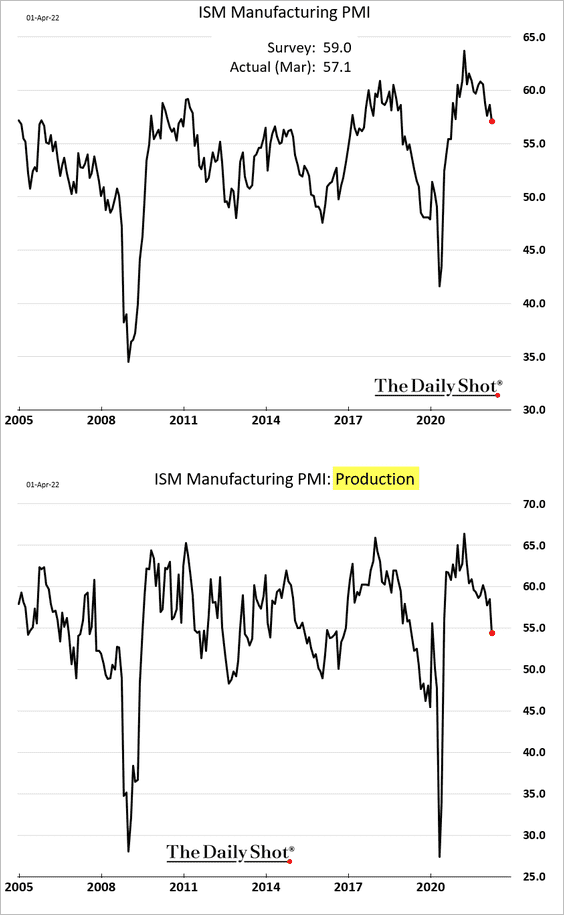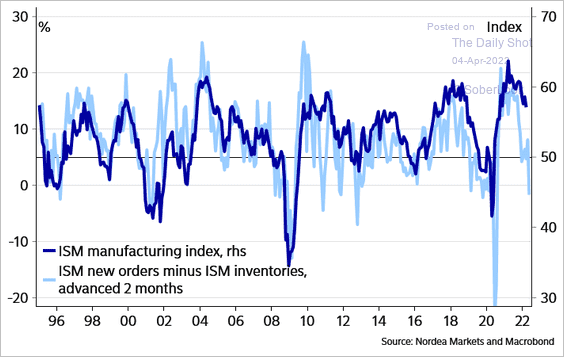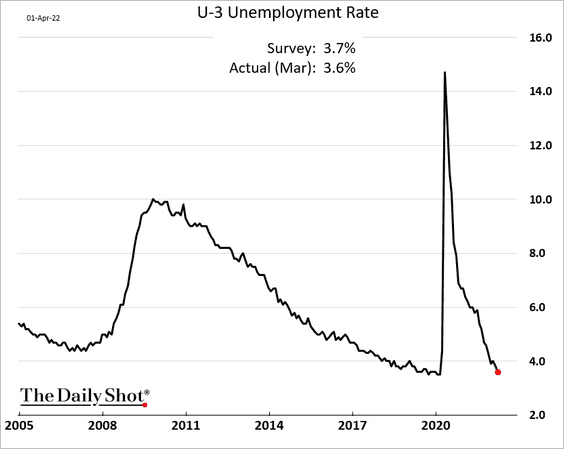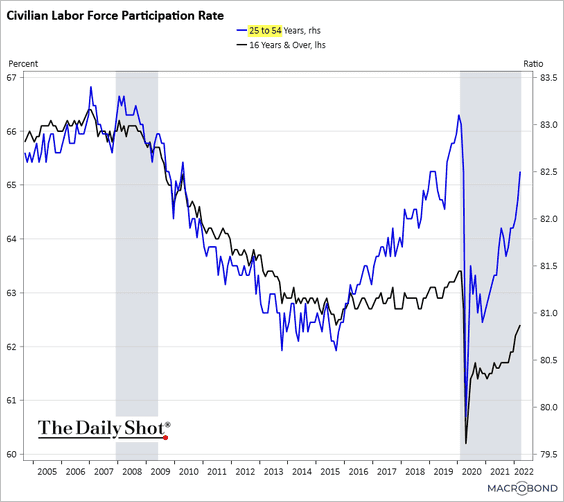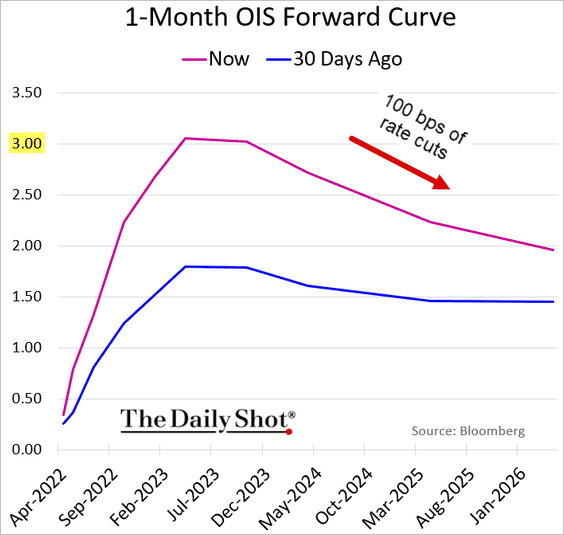April 5
Ukraine
The atrocities committed by the Russian military in Bucha, Ukraine are increasing the resolve of free countries to stay the course. By nature the United States is an impatient nation, but when its people are united on matters of national security, the country can be infinitely patient. See the old Cold War.
President Biden is doing a pretty good job on Ukraine. The people have his back. The country will stay the course, without regime change it will be a decades long conflict.
Eliot Cohen, a professor at SAIS, of Johns Hopkins University and formerly a counselor to Secretary of State Condoleezza Rice during the Bush W. Administration, writing in the Atlantic, a publication I just subscribed to, says:
Russia appears to be revising its strategy in Ukraine. In place of the go-for-broke attempt to swallow the country in a hundred-hour war, to be completed with a tank parade in the Kyiv Maidan and a semi-annexation, some Russian leaders now talk more modestly of operations in the Donbas. Movements on the ground would seem, for the moment, to confirm this shift. The question is how the West—and in particular, the United States—should react, especially if the negotiations between Ukraine and Russia edge toward some kind of truce.
Nothing in Russia’s pronouncements or behavior suggests that the long-term goal of the Putin regime has shifted from the desire to subjugate Ukraine, replacing President Volodymyr Zelensky and his subordinates with a quisling government and eliminating the country’s independence in all but name. Indeed, the apocalyptic rhetoric of Russian news commentators and senior civilian leaders suggests that the war’s aim has not changed. The giddy aspirations of February 24, though, have encountered the realities of the battlefield. Delusions are often modified by the sight of hundreds of burning vehicles.
The Russian state, and much of the elite society beneath it, rests on corruption, lies, lawlessness, and coercion. The state has bred an army at the mercy of corrupt bureaucrats, contractors, and soldiers. Small wonder that Russian soldiers have been issued rations that expired a decade ago and first-aid bandages that are 45 years old.
With its elites acquiring magnificent yachts from the national wealth they have plundered, it is little surprise that its stockpiled missiles have high failure rates, that the cheap tires on its vehicles burst, and that we have begun seeing incidents of soldiers trying to kill their commanders.
One part of the strategic shift, therefore, will probably be an intensification of negotiations, seeking to divide the Ukrainians and the West by offering cease-fires, temporary withdrawals to new lines, and the like. This, then, is as good a moment as any for the West to reconsider its own objectives and its strategy, for the months and years ahead.
For Western powers to accept, let alone advocate for, anything less than what Ukrainians are willing to accept is unthinkable, even by way of an interim settlement. Their land, their blood, and their struggle have bought time for other post-Soviet states. Beyond this, the West wants a Ukraine that is both free and strong: free because morality and interest demand it, and strong because without military power, freedom will remain unachievable.
A free and strong Ukraine is not, however, simply a matter of decency, though it is that. Ukraine will be the barrier behind which the West can repair its shocking neglect of military power in the past decades. If Ukraine prevails, its example will be at least a partial deterrent to further adventures by Russia, and perhaps by China. And it will deny Russia its most important objective—the re-creation, in subtler form, of the old Russian empire.
In Warsaw, Poland, President Joe Biden blurted out that Vladimir Putin needs to go. His embarrassed staffers quickly and implausibly walked that back, but of course he is right. This is Putin’s war, and it will be his humiliation; none of Russia’s neighbors will be safe so long as he is in power. The United States will not march to Moscow, but it would do well to signal to the security elite in Russia that their country has no future with Putin in charge.
But Putin may not fall quickly. And even if he does, he may very well be succeeded by a dictator or dictatorial clique almost as problematic as he. (Almost, because there is a difference between a thug and a thug who has had the chastening experience of seeing his predecessor eliminated for adventurism.) For some period of time, therefore, it will be in the West’s interests to keep Russia weak, internally divided, and militarily impotent. A liberalizing revolution may come, because nothing is impossible, but there is no reason to act as though it has already arrived or is imminent.
Professor Cohen is dead right. Biden spoke truth about the necessity of regime change. The United States must rearm, increasing military spending by 50 percent a year for the next decade or longer. Without regime change Russia is an implacable deadly enemy. Finally, a free Ukraine sends a clear message to China’s Xi, liberty is the future not tyranny.
As a complete aside, China is now forcibly removing children from households where Covid is present. Family, community and liberty are things that matter, they are worth fighting for.
Markets and Stocks
The economy is slowing even as the employment market remains robust. Manufacturing data is coming in weaker than expected.
Anecdotal reports say that the transportation sector is rolling over.
But a 2022 recession is unlikely. The strong employment market is a powerful buffer against economic contraction.
Though the Fed looks at the slope of the yield curve between 3 month T bills and 2 year Treasury notes as a predictive tool for the economy-currently signaling all go-the market is fixated by the yield inversion of the 2 year Treasury note and the 10 year Treasury note. Yes, an inversion of the 2 and 10 does signal a recession is coming but when. The current inversion could signal a recession will occur in 7 months or 33 months, quite a spread.
I will just watch the data and focus on my bets: energy, agriculture, industrial metals, defense, big technology, proprietary semiconductors and reopening names which serve the more affluent.
The big banks are lagging, but I will wait to see the Q1 earnings before buying more or selling. The biggest banks begin to report next week. Last week’s earnings release by Jefferies - big earnings beat- gives me confidence that GS and MS will bring home the bacon when they report.
Economics
The Biden Administration and the progressive wing of the Democratic Party are anti free market capitalism. They believe that they, left wing policy elites, can guide markets and allocate capital in a manner superior to the collective wisdom and welfare of the people which is after all the market. As I have written over and over, the left and the right of American politics want to take liberty and power from the people and concentrate that power in the hands of the few. Is it democratic for government to say that Amazon, Alphabet, Apple and Meta must charge higher prices and offer inferior products and services so that less efficient competitors can compete.
On its face, economic policy that promotes inefficiency and inflation is absurd. Since, Robert Bork wrote his seminal work, The Antitrust Paradox, U.S. antitrust law has been about economic efficiency and consumer welfare, not economic inefficiency and the power of government to limit consumer liberty.
Free market economists writing in the Journal explain:
With major antitrust legislation headed to the Senate floor, it is important to remember that over the past half-century, a bipartisan consensus has existed that antitrust law and enforcement should be anchored in consumer welfare. This consensus, beginning in the 1970s, was founded on a bipartisan rejection of Progressive-era regulatory frameworks that harmed consumers, competitiveness and economic growth. In one of his first and most important executive orders, President Biden committed his administration to returning to those Progressive-era policies, which pick winners and losers, substitute government edicts for market forces, and bestow on unelected bureaucrats expansive power to engage in industrial policy.
The modern progressives who dominate the Biden administration have labeled themselves Neo-Brandeisians after Justice Louis Brandeis, who claimed that “the evils of excessive bigness are something distinct from and additional to the evils of monopoly.” Sen. Elizabeth Warren, who believes that only government should be big and powerful, has worked to ensure that committed progressives hold key levers of regulatory power in the Biden administration. Notable examples include Tim Wu, a special assistant to the White House National Economic Council; Lina Khan, chairman of the Federal Trade Commission; and Rohit Chopra, director of the Consumer Financial Protection Bureau.
These officials see the world through the lens of class warfare, as a zero-sum game. Like Progressives before them, they view the rule of law not as a cornerstone of liberty and democracy, but as an impediment to equality and the means by which the ruling class suppresses the masses. In their view, economics-based antitrust enforcement under the consumer-welfare standard drives this oppression. Sandeep Vaheesan of the Open Markets Institute, who has written academic papers with Ms. Khan, claims that an “antitrust enforcer anchored in consumer welfare is an antitrust enforcer anchored in anti-labor.”
While antitrust enforcement since the 1970s has sought to rise above politics by using economics-based analysis to measure consumer benefit, modern progressives reject the idea that antitrust enforcement is, and should be, apolitical. To them, economics isn’t a value-neutral discipline that guides sound decision-making. Matthew Stoller, who worked with Ms. Khan at the Open Markets Institute, believes “the point of economics as a discipline is to create a language and methodology for governing that hides political assumptions from the public.” To Ms. Khan, “all decisions are political insofar as government agencies are bringing them.”
Administration antitrust policy is radical. It smells of Marxist/Leninism where the state is all powerful and the people are just barnyard animals.
I have a bee in my bonnet on this topic. I will keep abreast of the proposed antitrust legislation. I continue to believe strongly that final passage is unlikely.
Politics
In great news for free markets, Senator Manchin says he opposes proposed climate change rule making by the Securities Exchange Commission.
Sen. Joe Manchin said Monday that he is “deeply concerned” about the new climate disclosures proposed by the Securities and Exchange Commission.
In a letter to the SEC, the West Virginia Democrat said that the proposals go against the regulatory body’s stated mission, and that such policies will add “undue burdens on companies,” especially in the fossil fuel industry.
Manchin said the SEC’s proposed rules “seemingly politicize a process aimed at assessing the financial health and compliance of a public company.” He pointed specifically to requirements around disclosure of Scope 3 emissions,. which are indirect emissions from a company’s supply chain. These emissions can be especially difficult to track.
In June, in the Supreme Court case, West Virginia v EPA, the Court should rule that “important regulatory questions” must be decided by clear Congressional legislation not by ambiguous language and goals.
Sociology
Every time I read a story about a mass shooting or a particularly violent crime, I feel anger and sadness. I feel anger because the United States refuses to recognize the truth that children need fathers who are strong role models. Male children especially need strong male role models. Rootless young men who grow up in poverty are 25 times more likely to carry and kill when they feel disrespected.
Government should focus on rebuilding nuclear families, communities and strong community institutions not income transfers. No one learns to make their bunk, to be responsible and to have high self esteem by receiving income transfers from the government.
Government should enforce gun control laws. It is a national tragedy and disgrace that 400 million guns circulate through the country.
I feel sadness about the mass shootings and violent crimes because each additional crime makes it less likely that Harlon and Todd will experience their miracle and come home, Harlon to his siblings and Todd to his mother.
Mass shootings and violent crimes make comprehensive criminal justice reform impossible. The people are too angry for rational thought regarding the greater good.




